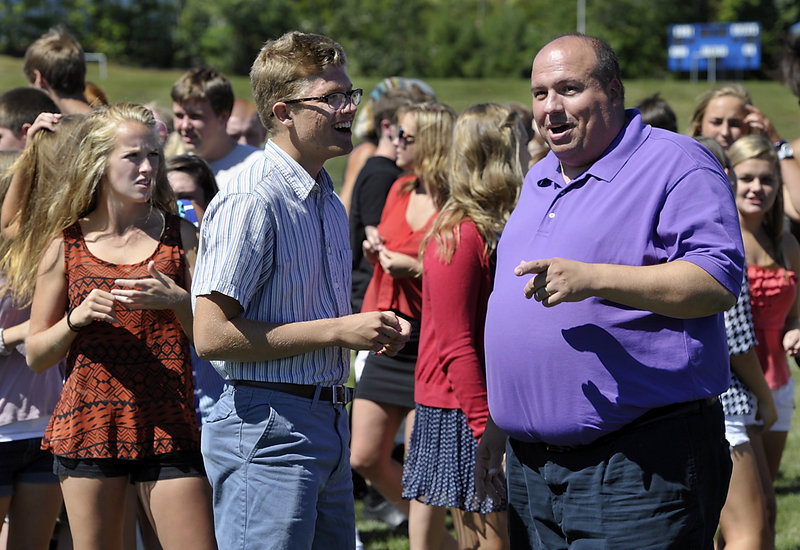NAPLES – Mason Kluge-Edwards wants to travel the world as a photojournalist. For two hours every Monday, he’ll learn about various cultures in the global studies academy at Lake Region High School.
At the same time, Dana Fitzgerald will be working on a project with a local organization in the academy of community service and public relations.
Meanwhile, Lucas Brown might be outdoors studying natural science.
Design and engineering, sports health and wellness, and visual and performing arts round out Lake Region High’s six academies. Every student had to enroll in one in this year as part of the school’s federally funded transformation.
After being named one of 10 persistently low-performing schools in Maine in 2010, Lake Region High was given $1.6 million to turn itself around and improve students’ achievement in three years — ending in June.
The grant has funded professional development and additional positions, including designated teacher leaders, who spend half of the school week out of the classroom and focused on the transformation. It has also paid for staff to stay after school and offer extra help to students.
But the money didn’t come without a cost.
Students and staff members said landing on the low-performing list hit morale hard.
“You’re telling people they failed. It’s a real blow,” said Jamie Riel, the school’s student advocate, a position created as part of the transformation.
The school also lost its longtime leader. A requirement for getting the federal money was that the principal of 16 years, Roger Lowell, had to go. Ted Finn, who was a middle school principal in Livermore Falls, was hired to replace him.
He got the job of implementing a 58-page transformation plan that called for eliminating academic departments and having teachers work as interdisciplinary teams.
“Change is never easy,” said Finn, talking about getting the faculty on board.
There was resistance from students, as well. Many talked about leaving the district, and a few did, said Lucas Brown, a senior.
“It was stressful,” said Fitzgerald, his classmate, who worried how the black mark on her school and the academic changes would look to colleges.
Although the school had a version of the academy-based approach last year, Finn said, feedback from students, parents and teachers indicated it had to be changed.
Making such adjustments every year has been “kind of annoying,” Brown said.
“It seems like we’re guinea pigs,” said Brown, who didn’t deny that future classes might benefit.
Kluge-Edwards said he already has seen a positive effect this year — and Wednesday was the first day of school.
At a meeting of the global studies academy, he said, there were students expressing interest in other cultures whom he had “never heard be interested about anything before.”
As for teachers’ attitude, there’s “a renewed optimism” and “a different kind of confidence in the air,” Riel said. “The staff is beginning to believe strongly in itself again.”
Whether the changes improve test scores — the metric that got Lake Region on the list — won’t be apparent for a few years.
But Finn cites one statistic as proof that they already have helped.
Of last year’s 146 seniors, 140 received diplomas on stage at graduation in June. The other six earned their diplomas by the end of July, finishing their courses early in the summer.
That’s the kind of effect the state Department of Education will look at this spring when it evaluates the six low-performing schools that received federal grants, said Rachelle Tome, who oversees the program for the state.
State education officials have been meeting regularly with the six principals to monitor their schools’ progress and offer support. The schools have had to show that they’re implementing their transformation plans every year before the state has released the annual allotments of federal funds.
There’s no concrete consequence if the schools don’t show significant improvement in academic achievement.
“They’ve spent the money. (The federal government) can’t go take it back,” Tome said.
But now that the staff and students feel what’s it like to be labeled low-performing, there might be more incentive for Lake Region High — a school once described as apathetic — to keep trying to get better.
Finn said that will require a willingness to keep changing, even without extra money to do it.
“We always have to reinvent ourselves,” he said.
Staff Writer Leslie Bridgers can be contacted at 791-6364 or at:
lbridgers@pressherald.com
Send questions/comments to the editors.




Success. Please wait for the page to reload. If the page does not reload within 5 seconds, please refresh the page.
Enter your email and password to access comments.
Hi, to comment on stories you must . This profile is in addition to your subscription and website login.
Already have a commenting profile? .
Invalid username/password.
Please check your email to confirm and complete your registration.
Only subscribers are eligible to post comments. Please subscribe or login first for digital access. Here’s why.
Use the form below to reset your password. When you've submitted your account email, we will send an email with a reset code.